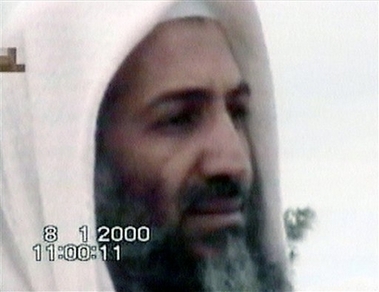WASHINGTON - The FBI's top counterterrorism official harbors lots of
concerns: weapons of mass destruction, undetected homegrown terrorists and the
possibility that old-fashioned mobsters will team up with al-Qaida for the right
price.
Though there is no direct evidence yet of organized crime collaborating with
terrorists, the first hints of a connection surfaced in a recent undercover FBI
operation. Agents stopped a man with alleged mob ties from selling missiles to
an informant posing as a terrorist middleman.
|

In this picture taken from video and provided by The Sunday
Times London, showing an man identified as Osama bin Laden, talking to
followers in a video dated January 8, 2000. [AP Photo/The Sunday
Times]
|
That case and other factors are heightening concerns about a real-life
episode of the Sopranos teaming with Osama bin Laden's followers.
"We are continuing to look for a nexus," said Joseph Billy Jr., the FBI's top
counterterrorism official. "We are looking at this very aggressively."
The new strategy involves an analysis of nationwide criminal investigations,
particularly white collar crime, side by side with intelligence and terrorist
activity.
"We have developed an ability to look harder and broader in a greatly
enhanced way to see if there is any crossover," Billy said in an interview with
The Associated Press.
Organized crime syndicates could facilitate money transfers or laundering,
human smuggling, identification fraud or explosives and weapons acquisitions,
officials said.
The options are many for terrorists groups.
There are the five reputed La Cosa Nostra families in New York, Russian
criminal enterprises from Brighton Beach in the New York borough of Brooklyn to
Moscow, and the emerging Asian crime syndicates that operate in many Islamic
countries with al-Qaida offshoots.
A contract study produced recently for the Pentagon and obtained by the AP
warned that the potential for organized crime assisting terrorists is growing.
"Although terrorism and organized crime are different phenomena, the
important fact is that terrorist and criminal networks overlap and cooperate in
some enterprises," the study said. "The phenomenon of the synergy of terrorism
and organized crime is growing because similar conditions give rise to both and
because terrorists and organized criminals use similar approaches to promote
their operations."
The traditional mafia has highly developed networks for acquiring goods and
services and money, all for a price.
The mob's potential interest in helping a terrorist has nothing to do with
ideology or sympathy but with greed, said Matt Heron, head of New York FBI's
organized crime unit.
"They will deal with anybody, if they can make a buck," Heron said. "They
will sell to a terrorist just as easily as they would sell to an order of
Franciscan monks. It's a business relationship to them."
"If the mob has explosives and a terrorist wants them and they have the
money, they could become instant friends," he said.
Pat D'Amuro, a retired senior FBI official and now chief executive of
Giuliani Security, said a Mafia boss once acknowledged that the mob would help
terrorists.
"I am aware of a high-level Mafia figure, who was cooperating with
authorities, being asked if the Mafia would assist terrorists in smuggling
people into Europe through Italy," D'Amuro said. "He said, 'The Mafia will help
who ever can pay.'"
Officials said they have no specific evidence that such a relationship has
been cemented. But concerns were heightened last year after an Armenian
immigrant was arrested in New York for allegedly leading a plot to sell military
weapons to an FBI informant posing as a middleman for terrorists.
Arthur Solomonyan had claimed to be able to deliver shoulder-fired missiles
from his connection in Russian organized crime to the informant, who claimed to
have ties to al-Qaida, federal prosecutors said. Solomonyan and 17 others in New
York, Florida and California were charged in the case.
Solomonyan is scheduled for trial this month. His lawyer, Seth Ginsberg, said
he plans to "vigorously contest" the charges and call the government's
confidential informant to the stand to challenge his motives. The Italian,
Russian, and Asian mafia remain active, particularly in New York, even though
the government has successfully prosecuted numerous figures in recent years.
In the past three years, well over 100 associates from all five La Cosa
Nostra families have been arrested in New York, Heron noted.
While the potential of a gangster-terrorist marriage is on the FBI's radar,
homegrown terror cells and weapons of mass destruction are also big concerns for
those in the FBI given the job of stopping the next terrorist attack.
"We are not only aware that they want to come across the ocean to attack us
but they may be physically here developing in our own homeland," Billy said.
The Internet has become the new Afghanistan, allowing terrorist sympathizers
to promote their radical ideas and to recruit and train followers right their
home computers. That makes it far more difficult for investigators to identify
them.
Billy said his biggest concern remains weapons of mass destruction. While
Hezbollah and Hamas are more defined terrorist groups, with a territorial focus
and a political platform, al-Qaida is more unpredictable.
"We know they were trying to acquire it prior to 9/11, bin Laden's own words
said that," said Billy. "What makes us think they are still not
trying?"